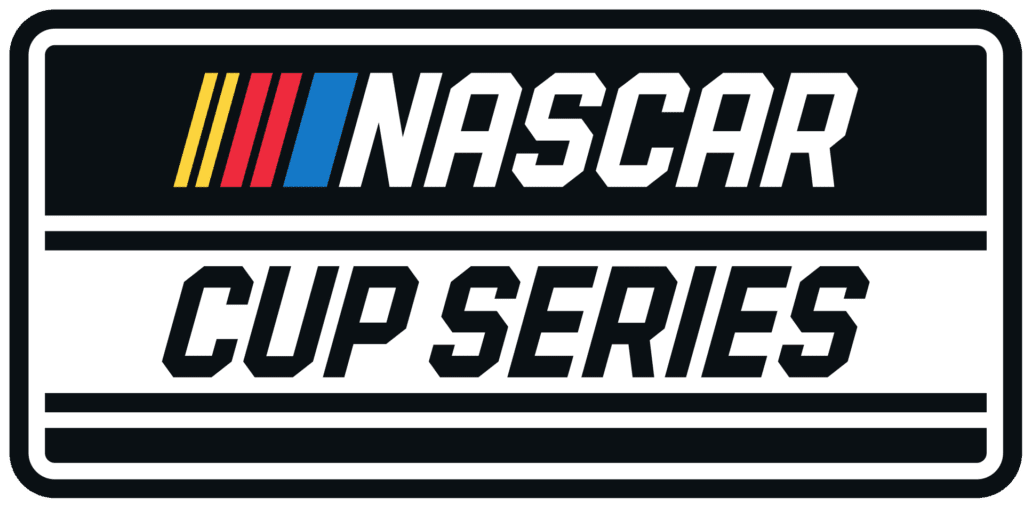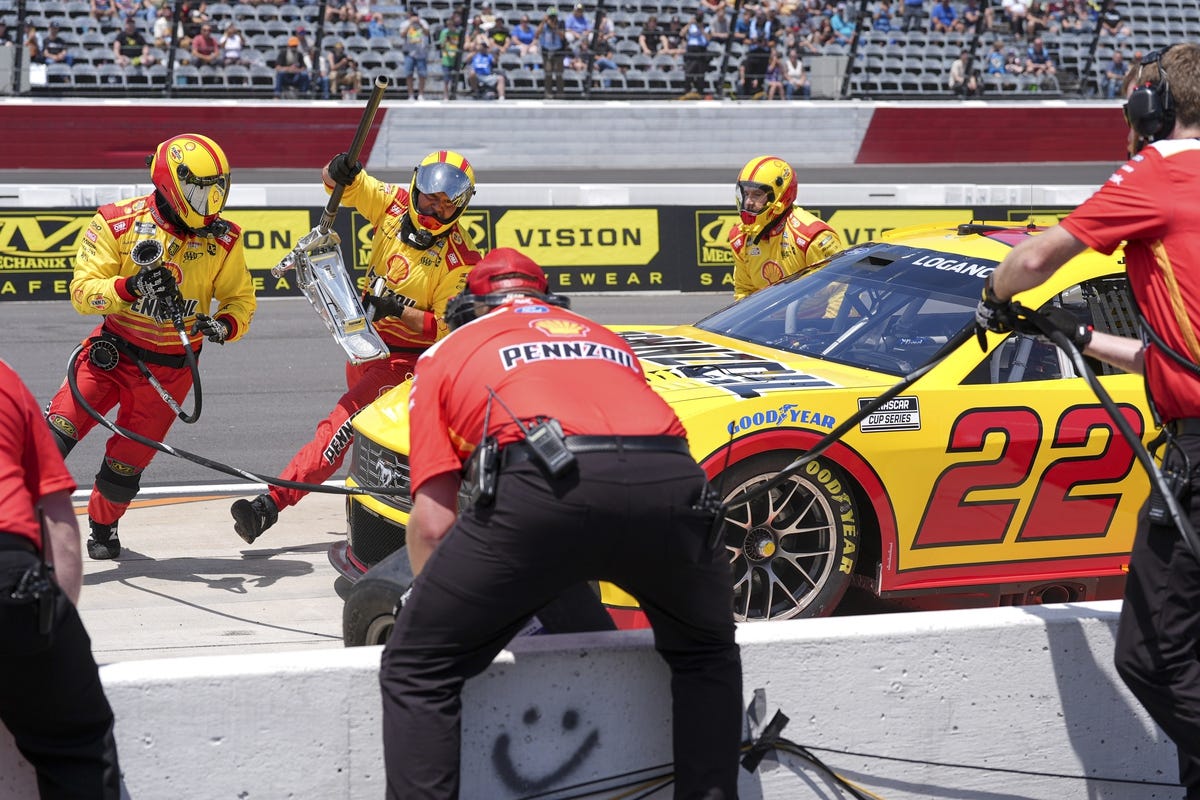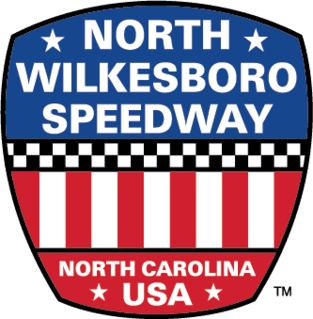By Reggie Gatlin-Holt



NASCAR Cup Series
Next Race: NASCAR All-Star Race
The Place: North Wilkesboro Speedway
Track Length: 0.625 Mile Asphalt Oval
The Date: Sunday, May 19
The Time: 8 p.m. ET
The Purse: $3,784,525
TV: FS1, 7 p.m. ET
Radio: MRN, SiriusXM NASCAR Radio
Distance: 125 miles (200 Laps)
NASCAR Cup Series
Next Race: NASCAR All-Star Open
The Place: North Wilkesboro Speedway
Track Length: 0.625 Mile Asphalt Oval
The Date: Sunday, May 19
The Time: 5:30 p.m. ET
The Purse: $678,700
TV: FS1, 5 p.m. ET
Radio: MRN, SiriusXM NASCAR Radio
Distance: 62.5 miles (100 Laps)
NASCAR Xfinity Series
Next Race: BetMGM 300
The Place: Charlotte Motor Speedway
Track Length: 1.5 Mile Asphalt Oval
The Date: Saturday, May 25
The Time: 1 p.m. ET
The Purse: $1,383,384
TV: FOX, 12:30 p.m. ET
Radio: PRN, SiriusXM NASCAR Radio
Distance: 300 miles (200 Laps); Stage 1 (Ends on Lap 45),
Stage 2 (Ends on Lap 90), Final Stage (Ends on Lap 200)
NASCAR CRAFTSMAN Truck Series
Next Race: Wright Brand 250
The Place: North Wilkesboro Speedway
Track Length: 0.625 Mile Asphalt Oval
The Date: Saturday, May 18
The Time: 1:30 p.m. ET
The Purse: $730,651
TV: FS1, 1 p.m. ET
Radio: MRN, SiriusXM NASCAR Radio
Distance: 156.25 miles (250 Laps); Stage 1 (Ends on Lap 70),
Stage 2 (Ends on Lap 140), Final Stage (Ends on Lap 250)
NASCAR Cup Series
Freshly paved North Wilkesboro Speedway sets the stage for NASCAR All-Star Weekend
NASCAR and Speedway Motorsports announced details for the 2024 NASCAR All-Star Race to be held on Sunday, May 19, for the second consecutive year at the newly paved North Wilkesboro Speedway. While the simplified format will return this season – featuring two heat races to set the All-Star Race starting lineup, a 100-lap All-Star Open, and a 200-lap main event – several new features will debut including a tire strategy element, a new Qualifying / Pit Crew Challenge format and pitting requirements. The spotlight will be on the stars of the sport as they take on these new challenges at the historic .625-mile track in the annual exhibition event for the grand prize of $1 million.
The signature new element in this season’s format centers around tire type and allotment. Potentially, three different tires will be utilized throughout the event weekend— a “prime tire” (the baseline tire assessed in the Goodyear Tire Test at North Wilkesboro Speedway), an “option tire” (slick tires, but made with the same rubber as the wet weather tire, making it a softer tire with more grip and faster wear) and “wet weather” (the wet weather tire only used if the track is wet). The ‘Goodyear Eagle’ lettering will be yellow on the prime tires, red on the option tires, and white on the wet weather tires.
The particulars on the tires:
- Teams will be allotted nine sets of tires for the event weekend.
- For practice, qualifying, the heat races, and the Open, teams will be allotted three sets of prime tires and two sets of option tires.
- For the All-Star Race, teams will have two sets each of primes and options.
- All four tires on the car must be of the same type at all times.
- Only the prime tire will be used during both qualifying sessions.
- For practice, the heat races, and the NASCAR All-Star Open, teams will have the option to start on any type of tire.
- All teams will start on the option tire for the All-Star Race.
This Sunday, May 19, the NASCAR All-Star Open is scheduled to start at 5:30 p.m. ET and the main event, the NASCAR All-Star Race, will follow at 8 p.m. ET – both will be broadcast on FS1, MRN and SiriusXM NASCAR Radio – with over $1 million dollars up for grabs.
2024 NASCAR All-Star Open and All-Star Race Formats
This season’s NASCAR All-Star Weekend will be similar to last year with a simplified format – – featuring two heat races to set the All-Star Race starting lineup, a 100-lap All-Star Open, and a 200-lap main event – several new features will debut including a tire strategy element, a new Qualifying / Pit Crew Challenge format and pitting requirements.
Select this link to view and download the All-Star Race Format Graphic
Friday, May 17 – NASCAR All-Star Open Qualifying format is as follows:
- Two laps, the fastest lap counts
- Traditional qualifying session
- Qualifying results determine the starting lineup for the NASCAR All-Star Open.
- Must be on prime tire
Friday, May 17 – NASCAR All-Star Race Qualifying format is as follows:
- Three laps, including pit stop
- Competitors will take green flag and run one full lap at speed, and on the second lap will proceed (maintaining pit road speed on pit road) to one of the two designated pit stalls for a four-tire stop, with mock fuel delivery.
- When the pit stop is complete, the cars will exit pit road (maintaining pit road speed), and race back to the checkered flag.
- Qualifying time will be the total elapsed time from green flag to checkered flag.
- Pole sitter will sit on the pole for Heat Race 1 and the All-Star Race.
- Must be on prime tire
Friday, May 17 – NASCAR All-Star Pit Crew Challenge format is as follows:
- Fastest pit stop
- The pit crew with the fastest pit stop during the NASCAR All-Star Race Qualifying attempt is the winner of the Pit Crew Challenge.
- Pit Crew Challenge results determine the order of pit picking.
Saturday, May 18 – NASCAR All-Star Heat Race 1 & 2 formats are as follows:
- Two Heat Races, 60 laps each (37.5 miles each).
- The 17 drivers already locked into the NASCAR All-Star Race field will be split into two 60-lap Heat races on Saturday night (May 18) which will determine the starting lineup for the All-Star Race.
- All laps (caution and green flag) will count. Each Heat race will get one chance at overtime if needed.
- Results of Heat 1 will establish the inside row for the All-Star Race, results of Heat 2 will establish the outside row for the All-Star Race.
- ‘All-Star Caution’ at or around Lap 30 of each Heat Race, with mandatory four-tire pit stop.
- The remaining teams not already locked into the NASCAR All-Star Race will compete in the All-Star Open.
Sunday, May 19 – NASCAR All-Star Open format is as follows:
- The All-Star Open on Sunday (May 19) will feature the 20 drivers not previously eligible for the All-Star Race.
- The All-Star Open will be 100 laps (62.5 miles).
- All laps (caution and green flag) will count. The Open will get one chance at overtime if needed.
- ‘All-Star Caution’ at or around Lap 50, with mandatory four-tire pit stop.
- Three Open drivers will advance to the All-Star Race – the top two race finishers and the Fan Vote Winner.
Sunday, May 19 – The NASCAR All-Star Race format is as follows:
- Technical rules for the cars will remain the same as other NASCAR Cup Series short track races.
- The NASCAR All-Star Race will be 200 laps (125 miles).
- Teams must start All-Star Race on option tire.
- Teams will have two sets each of primes and options. All four tires on the car must be of the same type at all times.
- All laps (caution and green flag) will count.
- NASCAR overtime rules are in effect (unlimited attempts).
- ‘All-Star Caution’ at or around Lap 100, and Lap 150.
- Each team must execute a four-tire stop during the Lap 100 ‘All-Star Caution’.
- All-Star Race winner earns $1 million.
History Lesson: NASCAR All-Star Edition
The NASCAR All-Star Race was introduced in 1985 at Charlotte Motor Speedway, and the first All-Star race was won by NASCAR Hall of Famer Darrell Waltrip and crew chief Jeff Hammond. Waltrip led 27 laps in the 70-lap inaugural All-Star event en route to the win driving the No. 11 Junior Johnson & Associates Buick. It was Waltrip’s only career All-Star win.
This weekend’s NASCAR All-Star Race will be the 40th running of the prized exhibition race and North Wilkesboro Speedway (2023-2024) is the fifth different track to host the event; joining Charlotte Motor Speedway (34 All-Star races: 1985, 1987-2019), Atlanta Motor Speedway (1986), Bristol Motor Speedway (2020) and Texas Motor Speedway (2021-2022).
The second NASCAR All-Star Race in 1986 was held at Atlanta Motor Speedway and the event was dominated by NASCAR Hall of Famer Bill Elliott, who set the record for the highest percentage of laps led in a NASCAR All-Star Race by a driver that won the event, leading 82 of the scheduled 83 laps for 98.8% of the event. Elliott started the race in the second starting position.
Twice the NASCAR All-Star Race has been led by one driver flag-to-flag and both occurred at Charlotte; Dale Earnhardt led all 70 laps in 1990 and Davey Allison led all 70 laps (100%) in 1991.
The next 33 All-Star events would be held at Charlotte Motor Speedway until the 2020 season, due to the restrictions brought on by the COVID-19 pandemic, the race was rescheduled and moved to Bristol Motor Speedway. Hendrick Motorsports driver Chase Elliott grabbed his first NASCAR All-Star Race win at Bristol that season. The win made the Elliotts (Bill and Chase) the second father-son duo to win the NASCAR All-Star Race all-time, joining the Earnhardts (Dale and Dale Jr.).
Then in 2021, the special non-points event was moved to Texas Motor Speedway for the first time. And for the second straight season, the NASCAR All-Star Race was won by a Hendrick Motorsports driver – Kyle Larson. Hendrick Motorsports leads the NASCAR Cup Series in NASCAR All-Star race victories with 10 wins among five drivers – Jimmie Johnson (four: 2003, 2006, 2012, 2013), Jeff Gordon (three: 1995, 1997, 2001), Terry Labonte (1999), Chase Elliott (2020) and Kyle Larson (2021). It also was the second consecutive season the NASCAR All-Star Race winner went on to win the NASCAR Cup Series Championship in the same season. The feat has occurred 12 times since the inception of the All-Star race in 1985 by seven different drivers – Darrell Waltrip (1985), Dale Earnhardt (1987, 1990, 1993), Rusty Wallace (1989), Jeff Gordon (1995, 1997, 2001), Jimmie Johnson (2006, 2013), Chase Elliott (2020) and Kyle Larson (2021).
Then in 2022, the NASCAR All-Star race at Texas Motor Speedway was won by Team Penske’s Ryan Blaney. Blaney dominated the event once getting out front leading 84 of the 140 scheduled laps (60%). It was his first victory in the special non-points event and the fourth for Team Penske – Blaney (2022), Joey Logano (2016), Kurt Busch (2010), Ryan Newman (2002).
Then last season, in the first NASCAR Cup Series event at North Wilkesboro Speedway since 1996, Hendrick Motorsports’ Kyle Larson put on a short track clinic leading the series-most laps in an All-Star race holding the point for 145 of the 200 scheduled laps and taking the win. It was his third All-Star race career win – series-most among active drivers and tied with Dale Earnhardt and Jeff Gordon for second-most all-time behind Jimmie Johnson.
All-Stars of the All-Stars
In total, the 39 NASCAR All-Star Races have produced 26 different winners, led by NASCAR Hall of Famer Jimmie Johnson with four All-Star victories (2003, 2006, 2012 and 2013).
Hendrick Motorsports driver Kyle Larson (2019, 2021, 2023) leads all active competitors in NASCAR All-Star Race wins with three victories, including last season’s race at North Wilkesboro.
In total, six of the 26 former NASCAR All-Star Race winners are entered this weekend:
|
Active All-Star Winners |
Wins |
Seasons |
|
Kyle Larson |
3 |
2023, 2021, 2019 |
|
Ryan Blaney |
1 |
2022 |
|
Chase Elliott |
1 |
2020 |
|
Kyle Busch |
1 |
2017 |
|
Joey Logano |
1 |
2016 |
|
Denny Hamlin |
1 |
2015 |
All the on-track action begins for the NASCAR Cup Series with Pit Road Qualifying Practice at 4:30 p.m. ET on Friday, May 17 and first practice will be at 4:35 p.m.
No better view of that $1 Million prize than from the front row
Starting upfront has its benefits, especially against the best of the best in the NASCAR All-Star Race.
The first and second starting positions are the most proficient starting positions in the field, producing more winners (six each) than any other starting position in the NASCAR All-Star Race (a combined 31.58%) – most recently, Kyle Larson from the pole in 2021 and Ryan Blaney from the second starting position in 2022.
The NASCAR All-Star Race has been won from the pole or first starting position six times by five different drivers, the first three came in consecutive years – Dale Earnhardt (1990), Davey Allison (1991, 1992), Kurt Busch (2010), Denny Hamlin (2015) and Kyle Larson (2021).
The 39 NASCAR All-Star Races have also produced 19 different pole winners; four of the 19 are active this weekend:
|
Active All-Star Pole Winners |
Poles |
Seasons |
|
Kyle Busch |
4 |
2022, 2012, 2011, 2008 |
|
Daniel Suarez |
1 |
2023 |
|
Kyle Larson |
1 |
2017 |
|
Denny Hamlin |
1 |
2015 |
Who’s already locked into the Main Event – the 2024 NASCAR All-Stars
Heading into this weekend at North Wilkesboro Speedway, 17 different drivers have already earned their spot in the 2024 NASCAR All-Star Race on May 19 at 8 p.m. ET on FS1, MRN and SiriusXM NASCAR Radio.
All-Star Eligibility for 2024: Those eligible for the NASCAR All-Star Race include drivers who won a points event in either 2023 or 2024, drivers who won a NASCAR All-Star Race and compete fulltime and drivers who won a NASCAR Cup Series championship and compete fulltime.
|
Entry |
Veh# |
Driver |
Organization |
Crew Chief |
OEM |
|
1 |
1 |
Ross Chastain |
Trackhouse Racing |
Phil Surgen |
Chevrolet |
|
2 |
5 |
Kyle Larson |
Hendrick Motorsports |
Cliff Daniels |
Chevrolet |
|
3 |
6 |
Brad Keselowski |
RFK Racing |
Matt McCall |
Ford |
|
4 |
8 |
Kyle Busch |
Richard Childress Racing |
Randall Burnett |
Chevrolet |
|
5 |
9 |
Chase Elliott |
Hendrick Motorsports |
Alan Gustafson |
Chevrolet |
|
6 |
11 |
Denny Hamlin |
Joe Gibbs Racing |
Chris Gabehart |
Toyota |
|
7 |
12 |
Ryan Blaney |
Team Penske |
Jonathan Hassler |
Ford |
|
8 |
16 |
AJ Allmendinger (i) |
Kaulig Racing |
Travis Mack |
Chevrolet |
|
9 |
17 |
Chris Buescher |
RFK Racing |
Scott Graves |
Ford |
|
10 |
19 |
Martin Truex, Jr. |
Joe Gibbs Racing |
James Small |
Toyota |
|
11 |
20 |
Christopher Bell |
Joe Gibbs Racing |
Adam Stevens |
Toyota |
|
12 |
22 |
Joey Logano |
Team Penske |
Paul Wolfe |
Ford |
|
13 |
24 |
William Byron |
Hendrick Motorsports |
Ryan Fugle |
Chevrolet |
|
14 |
34 |
Michael McDowell |
Front Row Motorsports |
Travis Peterson |
Ford |
|
15 |
45 |
Tyler Reddick |
23XI Racing |
Billy Scott |
Toyota |
|
16 |
47 |
Ricky Stenhouse |
JTG Daugherty Racing |
Michael Kelley |
Chevrolet |
|
17 |
99 |
Daniel Suárez |
Trackhouse Racing |
Matt Swiderski |
Chevrolet |
In total, 20 drivers will make a start in this season’s NASCAR All-Star Race – the 17 drivers that have earned a spot in the event, plus three additional positions that will be added to the NASCAR All-Star Race field following the All-Star Open – the All-Star Open Winner, the All-Star Open runner-up finisher and the Fan Vote Winner.
Last season, Noah Gragson won the Fan Vote, Josh Berry earned his spot in the All-Star Race by winning the All-Star Open and Ty Gibbs earned his spot by finishing runner-up to Berry in the Open.
A glimpse into the NASCAR All-Star Open
The NASCAR All-Star Open was first introduced into the All-Star format on May 11, 1986, at Atlanta Motor Speedway; the non-points special event was won by NASCAR Hall of Famer Benny Parsons with crew chief Cliff Champion, but it did not grant the team entry to the All-Star Race; that started the following season. Parsons won the first All-Star Open driving a Jackson Brothers Racing’s Oldsmobile in 1986. This season, three drivers from the NASCAR All-Star Open will move on to compete in the NASCAR All-Star Race – The All-Star Open winner, the All-Star Open runner-up finisher, and the Fan Vote Winner.
There have been 41 NASCAR All-Star Open events, one per year since 1986; except in 2000, 2001 and 2002, it was held as two events with both of the winners moving on to the All-Star Race. Starting in 2015, the All-Star Open was broken up into segments and then in 2017 it was divided into stages and each winner of the segments, or the stages earned a spot in the All-Star Race. Starting last year, the winner of the All-Star Open and the runner-up finisher move on to the All-Star race.
The All-Star Open has featured a field that has ranged from as large as 36 drivers from 1994-1996 to 14 drivers in the inaugural event in 1986. The 2022 season’s All-Star Open field at Texas had 16 participants and last season’s event at North Wilkesboro Speedway also had 16 participants. This season’s Open will have 20 competitors vying for the spots to move on.
A total of 30 different drivers have won the NASCAR All-Star Open from 1986-2023, and five of the 30 former All-Star Open winners are active this weekend, but four of the five have already earned spots in the All-Star Race this season, the only exception is Josh Berry.
|
Active Open Winners |
Wins |
Seasons |
|
Daniel Suarez |
2 |
2022, 2017 |
|
Kyle Larson |
2 |
2019, 2016 |
|
AJ Allmendinger |
2 |
2018, 2008 |
|
Martin Truex Jr |
2 |
2010, 2006 |
|
Josh Berry |
1 |
2023 |
Sterling Marlin leads the NASCAR Cup Series in NASCAR All-Star Open wins with four victories (1988, 1989, 1993 and 2004).
Eight of the 30 NASCAR All-Star Open winners have multiple wins – Sterling Marlin (four wins), AJ Allmendinger, Clint Bowyer, Jeremy Mayfield, Martin Truex Jr., Michael Waltrip, Kyle Larson and Todd Bodine each have two Open victories. And three drivers have won consecutive NASCAR All-Star Open events – Sterling Marlin (1988-89), Michael Waltrip (1991-92) and Clint Bowyer (2014-15).
Ryan Newman (2002) and Kyle Larson (2019) are the only two drivers to win the NASCAR Open and the All-Star Race in the same weekend.
Here are the 20 All-Star Open drivers vying for the three available positions in the NASCAR All-Star Race on Sunday.
|
Entry |
Veh# |
Driver |
Organization |
Crew Chief |
|
1 |
2 |
Austin Cindric |
Team Penske |
Brian Wilson |
|
2 |
3 |
Austin Dillon |
Richard Childress Racing |
Justin Alexander |
|
3 |
4 |
Josh Berry |
Stewart Haas Racing |
Rodney Childers |
|
4 |
7 |
Corey LaJoie |
Spire Motorsports |
Ryan Sparks |
|
5 |
10 |
Noah Gragson |
Stewart Haas Racing |
Drew Blickensderfer |
|
6 |
14 |
Chase Briscoe |
Stewart Haas Racing |
Richard Boswell II |
|
7 |
15 |
Kaz Grala |
Rick Ware Racing |
Billy Plourde |
|
8 |
21 |
Harrison Burton |
Wood Brothers Racing |
Jeremy Bullins |
|
9 |
23 |
Bubba Wallace |
23XI Racing |
Robert Barker |
|
10 |
31 |
Daniel Hemric |
Kaulig Racing |
Trent Owens |
|
11 |
38 |
Todd Gilliland |
Front Row Motorsports |
Ryan Bergenty |
|
12 |

PRESS RELEASE COURTESY NASCAR INTEGRATED MARKETING COMMUNICATIONS
